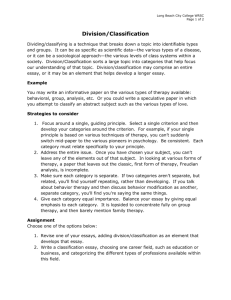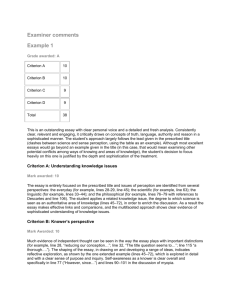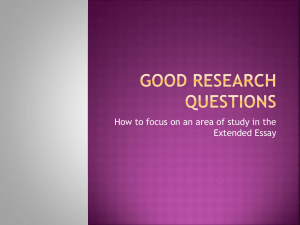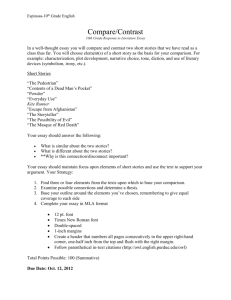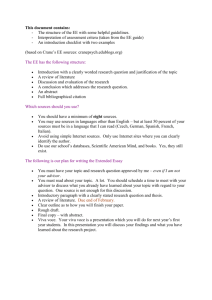Examiner comments - Uplift Education
advertisement
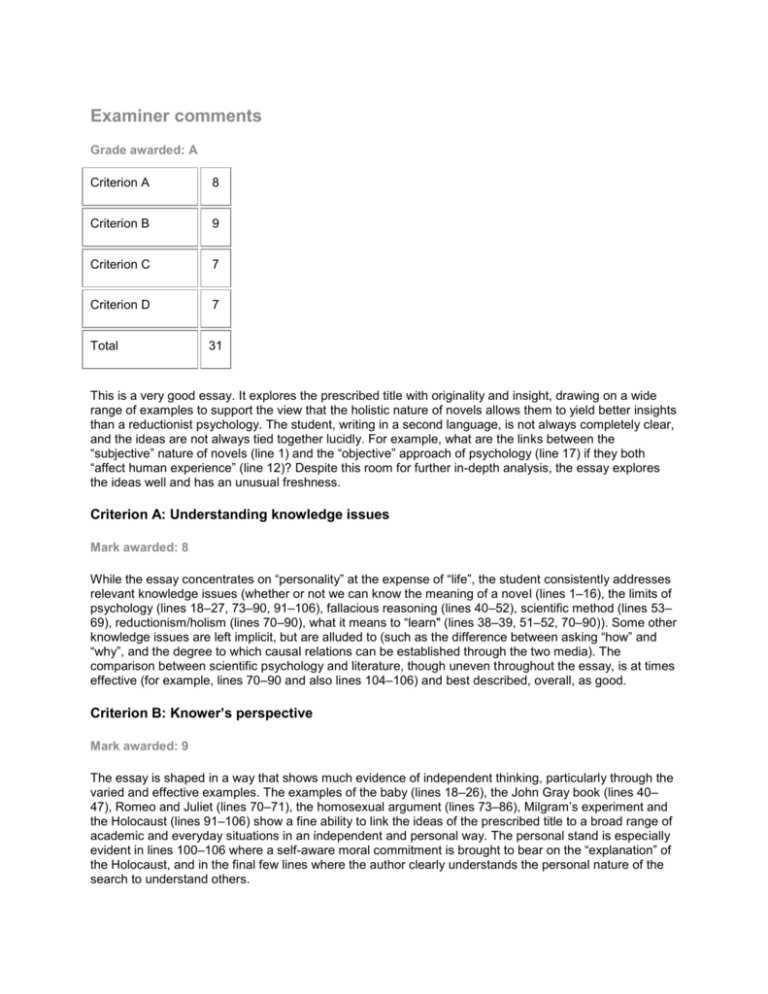
Examiner comments Grade awarded: A Criterion A 8 Criterion B 9 Criterion C 7 Criterion D 7 Total 31 This is a very good essay. It explores the prescribed title with originality and insight, drawing on a wide range of examples to support the view that the holistic nature of novels allows them to yield better insights than a reductionist psychology. The student, writing in a second language, is not always completely clear, and the ideas are not always tied together lucidly. For example, what are the links between the “subjective” nature of novels (line 1) and the “objective” approach of psychology (line 17) if they both “affect human experience” (line 12)? Despite this room for further in-depth analysis, the essay explores the ideas well and has an unusual freshness. Criterion A: Understanding knowledge issues Mark awarded: 8 While the essay concentrates on “personality” at the expense of “life”, the student consistently addresses relevant knowledge issues (whether or not we can know the meaning of a novel (lines 1–16), the limits of psychology (lines 18–27, 73–90, 91–106), fallacious reasoning (lines 40–52), scientific method (lines 53– 69), reductionism/holism (lines 70–90), what it means to “learn" (lines 38–39, 51–52, 70–90)). Some other knowledge issues are left implicit, but are alluded to (such as the difference between asking “how” and “why”, and the degree to which causal relations can be established through the two media). The comparison between scientific psychology and literature, though uneven throughout the essay, is at times effective (for example, lines 70–90 and also lines 104–106) and best described, overall, as good. Criterion B: Knower’s perspective Mark awarded: 9 The essay is shaped in a way that shows much evidence of independent thinking, particularly through the varied and effective examples. The examples of the baby (lines 18–26), the John Gray book (lines 40– 47), Romeo and Juliet (lines 70–71), the homosexual argument (lines 73–86), Milgram’s experiment and the Holocaust (lines 91–106) show a fine ability to link the ideas of the prescribed title to a broad range of academic and everyday situations in an independent and personal way. The personal stand is especially evident in lines 100–106 where a self-aware moral commitment is brought to bear on the “explanation” of the Holocaust, and in the final few lines where the author clearly understands the personal nature of the search to understand others. Criterion C: Quality of analysis of knowledge issues Mark awarded: 7 The analysis of knowledge issues is less effective than their identification and exemplification. The central claim, that the “clinical perspective” of psychology “disrupts the true understanding” (line 111) is explored with some insight in lines 70–106, but there is certainly room for more detailed inquiry. While the essay certainly explores the issues, the exploration is uneven; for example, the discussion of personality development (lines 30–39), while made relevant, is only weakly linked to the narrative of the essay. Counterclaims are implicitly explored throughout the essay by the juxtaposition of the two areas (for example, “explicit terms and definitions” (line 8) versus “complex words and experiments” (line 49)). Criterion D: Organization of ideas Mark awarded: 7 The essay is generally well structured. It starts by applying ideas of objectivity/subjectivity to the two areas of knowledge (lines 1–29) and goes on to look at how science explains things in general and personality in particular (lines 40–69) before considering two cases where it is argued that science does not give us as much insight as novels (lines 70–106). Concepts are generally, though not always, used clearly and while some issues are linguistic (for example, the inaccuracy of the statement “Novels as a form of art are subjective” (line 1)), other cases require further development (lines 11–12, line 103). Facts are all correct and all sources are acknowledged. While precise links from appropriate points in the text to the bibliography are missing, and a page number is required for lines 77–79, these are not significant deficiencies.


